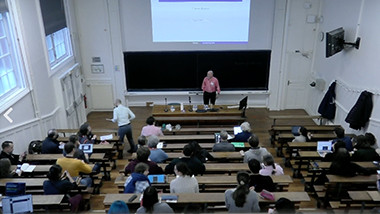
From connecting the dots to conjugacy of dynamical systems
De Pierre Arnoux
Apparaît dans la collection : Colloque Scientifique International Poincaré 100
Poincaré's article « Sur un théorème de géométrie » begins with the following sentence: « I never published a so uncompleted work ». The year 1912 was the year of his death and the great mathematician guessed that he will not have enough time to prove the fundamental result contained in this article. But he explained why this result was so important: to prove the existence of some peridic orbits in the restricted circular 3-Body problem and he gave a proof for some particular cases. Then G.D. Birkhoff proved the theorem and even gave an extended version of it. After him, some other mathematicians improved the statement and gave alternative proofs. In this talk, we will speak of some versions of the theorem (in particular the original one), explain the link with the 3-Body problem and give some idea of the proof(s). Note(s) Biographique(s) Elève à l'ENS entre 1983 et 1987, Marie-Claude Arnaud obtient son doctorat en 1990 à l'Université Paris 7. Ses recherches portent sur les domaines des systèmes dynamiques, les dynamiques symplectiques, hamiltoniennes et lagrangiennes, Closing lemma, Connecting lemma, Hamilton-Jacobi. Les théorèmes KAM faible, les ensembles d'Aubry-Mather, les applications déviant la verticale, la théorie ergodique . Depuis 2001 elle est professeur à l'UAPV. En 2011 elle a reçu le prix thématique de mathématiques Gabrielle Sand et Marie Guido Triossi de l'Académie des sciences.
